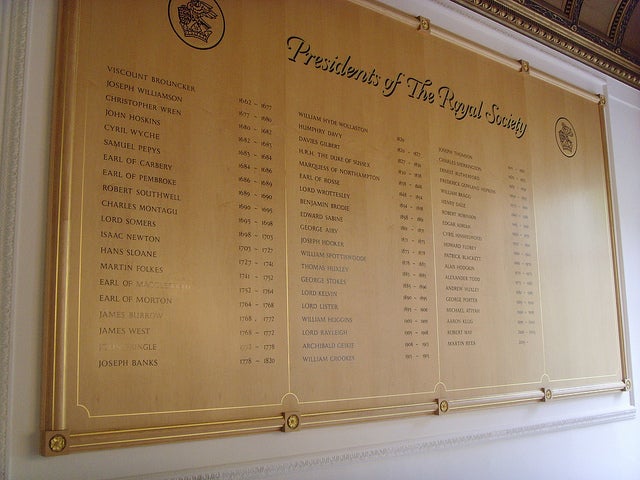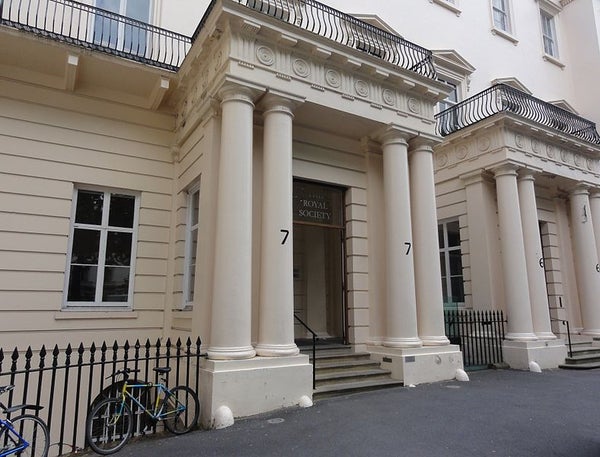This article was published in Scientific American’s former blog network and reflects the views of the author, not necessarily those of Scientific American
The World Conference of Science Journalism in South Korea has ended and I get on the long flight home from Seoul to London. During the flight I have a very disturbing dream.
It begins with me steering my wheeled luggage through the Nothing to Declare lane at Heathrow airport. I try to avoid the eyes of a customs officer; I don’t want to be delayed. I’m so relieved to be arriving home. It’s been a long and stressful week. Finally, I turn into the arrivals lounge, where chauffeurs hang out with oversized name cards. Lovers run weeping into each other’s arms and families are reunited. It’s happy space and the ambiance is good. Suddenly, out of the blue, a pack of journalists comes rushing up to me. They’re like the ones in those old, black-an-white movie ones: men in trench coats holding large microphones, cameras and flashbulbs all poised. They are all shouting the same question: “How did you think you would get a way with publically calling to account a prominent white male scientist?”
Twitter shaming has entered my subconscious since I called out Nobel Prize winner Tim Hunt for sexist remarks at the conference in Seoul last week. It’s easy to miss the point of this story within the social media firestorm that erupted afterward. How do you do good journalism—holding powerful people accountable for their actions—on Twitter without focusing too much attention on the individual?
On supporting science journalism
If you're enjoying this article, consider supporting our award-winning journalism by subscribing. By purchasing a subscription you are helping to ensure the future of impactful stories about the discoveries and ideas shaping our world today.

Tim Hunt speaks at European Research Council press confrence during a World Economic Forum meeting in 2013. (Photo by World Economic Forum/Nelson Ching via Flickr)
My decision to publish the story was straightforward. Hunt’s words and behavior were not only extremely sexist, but also culturally insensitive. His blustering statements were deeply disrespectful to the female Korean scientists who were hosting the luncheon where Hunt spoke. There is always a danger with breaking a story on Twitter because it is extremely difficult to conduct nuanced discussions about the news you’re presenting. As an academic I am acutely aware of this, yet something had to be said, and since I was traveling, Twitter was the solution. There was little point for the subsequent reaction to focus only on Hunt, however. His statements were just the very tip of the iceberg of the sexism in science. I wanted to be more strategic, so I planned my statements carefully.
First, I had to break the story, which I did three hours after the luncheon ended. Hunt’s comments had shocked many people in the room, including journalists and others, and I discussed them with a couple of colleagues, Deborah Blum and Ivan Oransky, who I’d been sitting next to. Unbeknown to each other we had written down what we had heard Hunt say at the lunch. Our quotes were identical, which meant we could independently verify the story, but I was still hesitant to broadcast Hunt's remarks. Women are vulnerable to vicious trolling on Twitter, and black women doubly so. So it was enormously supportive to have two journalists of Blum and Oranksy’s stature behind me.
We decided that I should publish the story on Twitter since it had a British angle, and that Deborah and Ivan would authenticate my account. I didn’t want to publish the story as a series of tweets so I decided to write a short news story with a comment at the end and post it as an image. I knew it was important to get it right. Hunt is a Nobel Laureate, a mentor of young scientists, male and female, with enormous administrative power and influence in international science.
Nobel scientist Tim Hunt FRS @royalsociety says at Korean women lunch “I’m a chauvinist and keep ‘girls’ single lab pic.twitter.com/Z9NhykaTPv
— Connie St Louis (@connie_stlouis) June 8, 2015I didn’t just call out Hunt in that first tweet, however, but also the Royal Society, the U.K.’s national academy of science, where he is a fellow. Sexual inequality in the STEM fields continues in part because the Society continues to take very little action. The British government has tasked the Society with addressing the enormous inequality experienced by women in science, and it receives vast amounts of taxpayer money to do this and other key science tasks. So a comment from the organization was needed. Yet the morning after my first tweet, the Society merely flagged its diversity initiatives but said nothing of Hunt’s comment. It was clearly inadequate, and I said so:
@royalsociety My response is below @carlzimmer @edyong209 @deborahblum @russellcris @ivanoransky #WCSJ2015 pic.twitter.com/7WUPOPoPYZ
— Connie St Louis (@connie_stlouis) June 9, 2015A few hours later, the society posted a statement on its website headlined, “Science needs women.” Again the wording was weak and naïve. The society said it had “acted to distance itself from reported comments” by Hunt, but didn’t say the obvious: sexism is wrong and should not be tolerated.
When Hunt arrived back in the U.K. from Korea he was asked to resign his honorary post by University College London. In an interviewThe Observer, a British paper that’s part of the Guardian Media Group, Hunt and his wife, Professor Mary Collins, who also has a post at UCL, accused the university of “hanging them out to dry”. A day later, the Royal Society confirmed that Hunt had also resigned from its Biological Sciences Awards Committee. Next, Hunt resigned from the board [[ß link added]] of the European Research Council, the organization that had taken him to South Korea.
While these organizations cleverly and surefootedly “distanced” themselves from Hunt, the narrative of the rogue scientist belies larger, institutional failings. The Royal Society, in particular, sidestepped these problems. I felt it would be a waste if the uproar ignored the forest for trees—rebuking only Hunt and not higher orders of power as well—so my next action was to present a framework for systemic change:
@royalsociety If you are committed to diversity and you say that you need women, why no female President ever? pic.twitter.com/UATVKg0Prv
— Connie St Louis (@connie_stlouis) June 9, 2015The Royal Society was founded in 1660 there has never been a female president, so I went to Change.org and set up a petition called, “Its time to elect a female president to lead the Royal Society.” So far there have been only 68 signatures. The enormous response on Twitter to the Hunt story as well as the ironic and creative #distractinglysexy response has obtained a huge worldwide coverage and has made it difficult to discuss anything, including concrete actions such as the one I propose.

A list of past presidents (all male) in the Royal Society. (Photo by Robert/Flickr)
When I landed at Heathrow, I learned that my in-flight dream had not been a premonition. There were no reporters in trench coats waiting for me. This story runs the risk of fizzling out and being forgotten. Condemning one mans’ sexist remarks is not enough. It is important that this episode also affects change for women in science. Please sign the petition. In the words of UCL pharmacologist David Colquhoun, it’s “an idea whose time has come (a while ago).”
